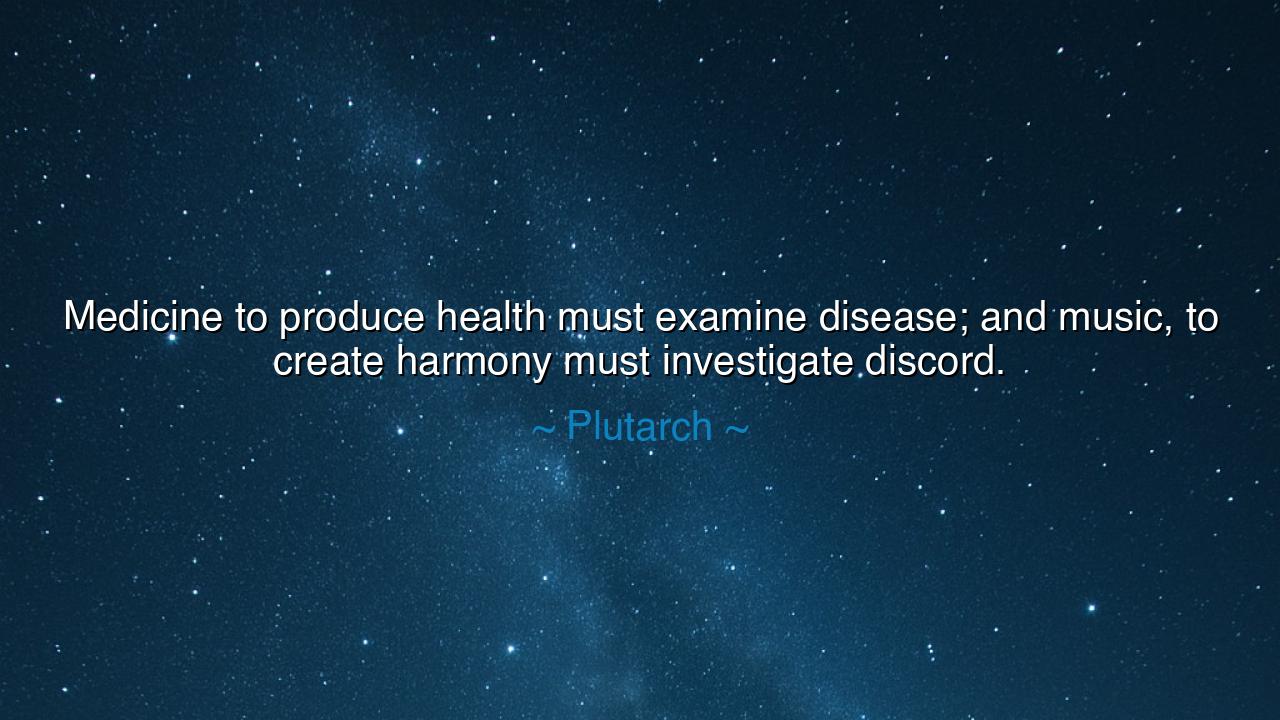
Medicine to produce health must examine disease; and music, to
Medicine to produce health must examine disease; and music, to create harmony must investigate discord.






When Plutarch wrote, “Medicine to produce health must examine disease; and music, to create harmony must investigate discord,” he revealed a truth that transcends both science and art—a truth about the nature of growth, understanding, and the duality of all creation. His words teach that wholeness is born not from avoidance, but from confrontation. Just as the physician must study sickness to bring healing, so too must the musician dwell in dissonance to find beauty. To seek perfection without acknowledging imperfection is to deny the very process through which wisdom is forged.
Plutarch lived in a time when philosophy, medicine, and music were not separate disciplines but parts of one great pursuit: the pursuit of harmony between body, mind, and spirit. In his eyes, health and harmony were not static states—they were dynamic balances, constantly renewed through struggle and correction. Disease was not merely an enemy, but a teacher. Discord was not chaos, but a lesson in structure. The wise, therefore, did not flee from pain or error—they studied it, learned from it, and turned it into mastery. This idea echoes through all ages: that we cannot understand what is right until we have looked closely at what is wrong.
Consider the great physician Hippocrates, whose name endures as the father of medicine. He did not heal through mysticism or blind hope, but through observation. He watched how the body broke and how it repaired itself. He catalogued symptoms, recorded fevers, studied corpses. He believed that to cure, one must first listen to the language of disease. From decay, he learned the laws of life. In the same way, the composer who crafts harmony must first confront the tension of dissonance—the clashing of tones that, when resolved, give rise to beauty. Without contrast, music is lifeless; without struggle, healing is incomplete.
Plutarch’s wisdom reaches beyond medicine and melody—it speaks to the human soul. Life itself is a vast composition of light and shadow, and to deny one is to misunderstand both. The man who seeks only joy and flees sorrow will never know peace; the one who acknowledges pain, and studies its cause, will discover a deeper and truer happiness. Every human heart, like an instrument, must learn to transform discord into resonance. This is the art of living well—to find in hardship the seed of strength, in failure the spark of insight, and in suffering the lesson of compassion.
History is filled with those who have learned this truth through fire. Think of Nelson Mandela, who endured decades of imprisonment yet emerged not with bitterness, but with clarity. He studied the disease of hatred and division until he understood its anatomy, and in doing so, became the physician of a wounded nation. His life was a harmony born from discord, a living testament to Plutarch’s teaching—that one must examine the shadow to bring forth the light.
So too in the realm of art, the greatest symphonies arise from tension. Beethoven, stricken with deafness, composed his Ninth Symphony not in comfort but in agony. He dwelled in the discord of silence, and from it, summoned music that speaks to eternity. His suffering became sound, his struggle became triumph. Through his pain, he found harmony not only in music, but in the soul of mankind itself. Thus, the philosopher’s words come alive: to heal, one must face the wound; to create beauty, one must first face chaos.
Plutarch’s message endures because it mirrors the rhythm of existence itself. The universe is not still—it trembles, it oscillates, it resolves. Health and sickness, harmony and discord, joy and sorrow—these are not opposites but partners in the eternal dance of balance. The wise do not reject struggle; they use it as a forge. Like the healer with his scalpel and the musician with his strings, they work with imperfection to reveal perfection.
Final Lesson: True understanding comes not from fleeing pain, but from studying it with courage. Healing, creation, and wisdom all arise from facing what is broken and transforming it through knowledge and grace.
Practical Actions: When life presents you with conflict, do not turn away. Examine it, learn from it, and let it refine you. When your spirit feels dissonant, listen closely—there may be a hidden melody waiting to emerge. Seek harmony not in avoidance, but in integration. For just as medicine studies disease to produce health, so must the soul confront discord to discover its music of peace.






AAdministratorAdministrator
Welcome, honored guests. Please leave a comment, we will respond soon